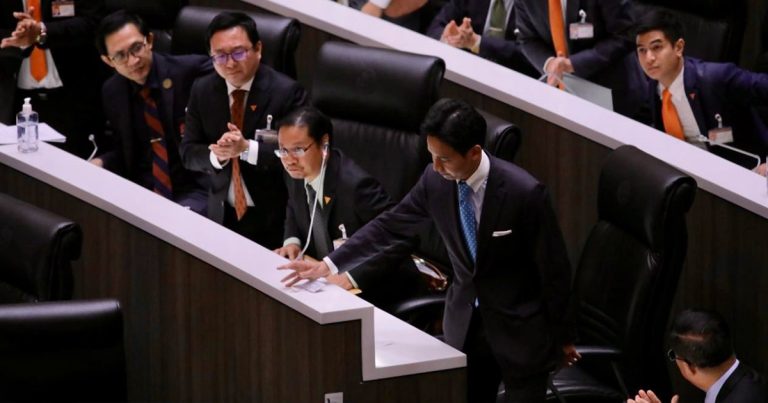19-7-2023 (BANGKOK) The bid by Thai reformist leader Pita Limjaroenrat to become prime minister ended on Wednesday, despite his party winning the most votes in the May elections, after the military and pro-royalist establishment obstructed his path to power.
Pita’s Move Forward Party (MFP) has ridden a wave of support from young and urban Thais exasperated with nearly ten years of army-dominated governance. However, its efforts to form a government have stumbled.
The 42-year-old was dramatically suspended from parliament while seated in the chamber for discussions on his candidacy, bringing his prime ministerial bid to an end when legislators voted to refuse considering him in a second ballot.
“I would like to say goodbye until we meet again,” he said, raising his fist as he departed the assembly floor to cheers from party allies.
Pita’s suspension occurred when Thailand’s Constitutional Court stated it would proceed with a case that could eliminate the leader from parliament altogether for possessing shares in a media company – forbidden for lawmakers under Thailand’s constitution, although the television station in question has not broadcast since 2007.
Pita, who is Harvard-educated and wealthy from a family-run agribusiness, has said the shares were inherited from his father. He has 15 days to respond to the case.
After he left parliament, lawmakers voted decisively that he could not be considered for the position a second time in this parliamentary session.
“Pita can’t be nominated twice in this parliamentary session,” speaker Wan Muhamad Noor Matha said, amid angry protests within the chamber, straightaway before the day’s proceedings were adjourned.
Dozens of supporters wept and shouted abuse at a large riot police barricade guarding the gates of parliament when news of Pita’s suspension emerged.
“Why even ask people to go to the polls?” one protester, unnamed, told the press.
Demonstrators began gathering in the evening for a public rally near Bangkok’s Democracy Monument, and police said they were prepared for any unrest.
“No matter their opinions, they need to follow the rules and orders set by the police,” stated Archayon Kraithong, a spokesperson for the Royal Thai Police.
OBSTACLES
Pita’s first attempt at the premiership failed when he was dozens of votes short of the required support in a joint parliamentary sitting.
Thailand’s senate is filled with military appointees, with only 13 of 249 serving senators having voted for Pita last week.
Other roadblocks have arisen to obstruct Pita’s candidacy. The court has also agreed to hear a case alleging that MFP’s campaign promise to amend Thailand’s royal defamation law amounts to a plan to “overthrow” the constitutional monarchy.
MFP has refused to compromise on its pledge to revise the law, which can jail convicted critics of the monarchy for up to 15 years.
MFP’s reformist agenda also poses a threat to family-owned business monopolies that have an oversized role in Thailand’s economy.
The Constitutional Court has intervened in Thai politics before. The billionaire leader of MFP’s predecessor party, Thanathorn Juangroongruangkit, was disqualified as an MP in 2019 for breaching the same shareholding rule.
COMPROMISE CANDIDATE
Pita has vowed to step aside for another party to form a government if his second attempt fails.
The coalition backing him is expected to unite behind property tycoon Srettha Thavisin, potentially relegating MFP to the opposition.
Srettha’s Pheu Thai party is seen as a vehicle for the Shinawatra political clan, whose members include two former prime ministers deposed by coups in 2006 and 2014.
But as a successful businessman popular with fellow tycoons, the 60-year-old Srettha is regarded as a potential compromise acceptable to Thailand’s elite.
Prawit Wongsuwan, 77, a former Thai army chief who was second-in-command of the 2014 junta, has also been suggested as a candidate by parliament’s military bloc.
Thai voters comprehensively rejected army-backed parties in May’s election.
According to political analyst Thitinan Pongsudhirak, the prospect of a military presence in the next government could ignite unrest in a country no stranger to political turbulence.




